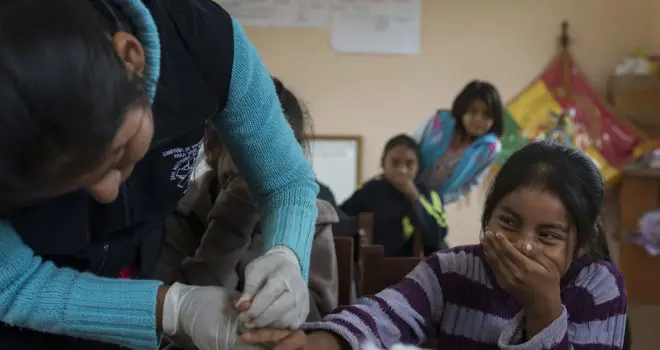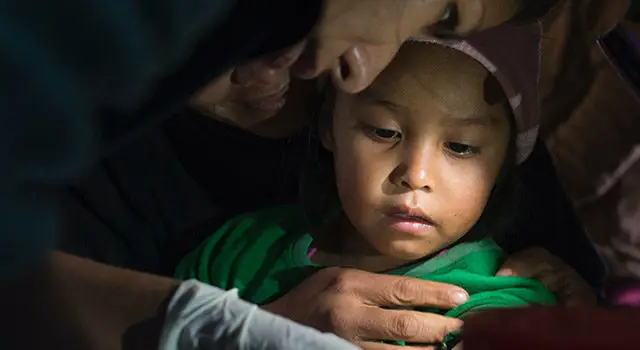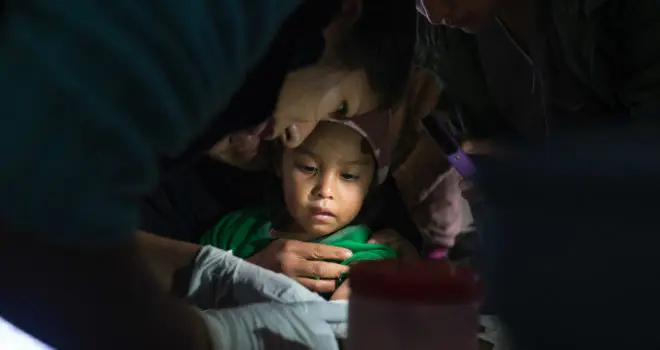On the occasion of World Chagas Disease Day on 14 April, WHF, a member of the Global Chagas Disease Coalition, wants to support patient associations in their call for better diagnosis and care for Chagas patients at the primary healthcare level. Below is a statement from the International Federation of Associations of People Affected by Chagas Disease (FINDECHAGAS).
Attend to us as soon and as close as possible, starting at the primary healthcare level
The elimination of Chagas disease as a public health problem will only be possible if timely detection, comprehensive care, notification, and epidemiological surveillance of affected people are reinforced through primary health care.
Public health specialists and scientists estimate that some 7 million people are infected with the Trypanosoma cruzi parasite; the cause of Chagas disease. They also estimate that there are more than 70 million people today who are at risk of becoming infected worldwide. Furthermore, they still estimate that every year there are more than 30,000 people in the world who are infected with this parasite (new cases) and that 12,000, very unfortunately, die from the disease. Finally, they estimate that at least 9,000 babies are born each year with the infection, transmitted during pregnancy or childbirth. And all this could be avoided by detecting and treating carriers of Chagas infection and disease early.
This April 14, World Chagas Disease Day, the individuals and families affected by this problem demand the right to be treated in a timely manner, starting with the first level of health care.
In addition, with the information and case reports in the health units closest to where we are, we can stop being estimated numbers. On World Chagas Disease Day 2022, we asked for help to know “where we are and how many we are”. It was our way of expressing the need to establish epidemiological surveillance and notification systems in all countries with cases of Chagas disease. In this way, the response to this complex problem will be able to rely on strategies and means appropriate to the realities of each place.
It is in primary health care with resources and training where information and comprehensive care must be provided to affected individuals and communities. It is in the closest health centers where the barriers to timely access (without delay) to diagnosis and treatment, as well as to the notification of acute and chronic cases, can be bridged. Otherwise, we will continue to not know the true magnitude of this global health problem, and we will continue to be lost in the clouds of vague estimates.
Among the different routes of transmission of the disease, we are currently especially concerned about vectorial, oral, and congenital (mother to child) modes of transmission. The first two are the ones that have registered the most cases in Latin America. And specifically the second causes outbreaks of oral transmission, typically affecting dozens of people at the same time, with high mortality (10%) without timely antiparasitic treatment. We are aware of the efforts that countries have made in vector control and the significant reduction achieved. We are also aware of the projects and initiatives that seek to interrupt mother-to-child transmission. But we have also witnessed the great impacts and challenges resulting from the COVID-19 pandemic.
But what worries us the most is that we are frequently at the bottom of the list of priorities in health care. Chagas disease has long ceased to be a problem exclusive to countries in Latin America, or to populations living in remote and rural communities. The vector, the infection, migrated with the affected people to cities and other towns, countries, and continents. Up to 44 countries in the world have reported cases of Chagas disease, but they still count us by estimates without knowing exactly where and how many we are.
The associations of people affected by the disease throughout the world (FINDECHAGAS) request countries to strengthen primary care systems, with the necessary resources and training, in accordance with the resolution approved at the World Health Assembly in 2010 (WHA63.20) that already 13 years ago urged action in this direction.
Timely detection, comprehensive care, follow-up, and notification of acute and chronic cases, epidemiological surveillance, and control of active infection transmission routes should begin at the first health level.
Attend us as soon and as close as possible.
Visit FINDECHAGAS and the Global Chagas Disease Coalition website to learn more.


